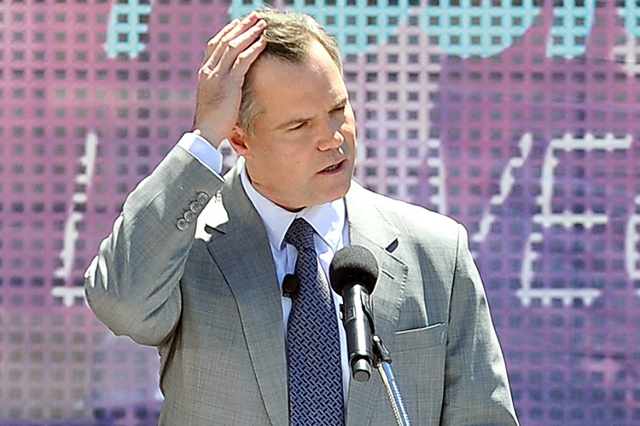MGM Resorts ‘very engaged’ in REIT discussions

It hasn’t been a quiet year for MGM Resorts International. The general belief is that it’s going to get much louder.
Wall Street expects MGM Resorts to announce some type of corporate initiative in the next few months, most likely spinning off a portion of its casinos into a real estate investment trust. The goal is to boost the company’s stock price and unlock more value.
MGM Chairman and CEO Jim Murren acknowledged the casino operator first explored the REIT process in 2007 but shelved the idea once the recession hit and construction of the CityCenter complex overwhelmed the company.
MGM dusted off the REIT playbook last year after regional casino giant Penn National Gaming’s success in spinning off Gaming and Leisure Properties Inc., as the first gaming-industry REIT.
“Clearly, it created value,” Murren said. “The sum of the parts are now worth a heck of a lot more than before.”
Murren was candid during an hourlong interview in his Bellagio office in June, a few weeks after MGM fended off a proxy fight from Land and Buildings Investment Management founder Jonathan Litt, who wanted to replace four of MGM’s board members with his own candidates.
Litt, who owns less than 1 percent of the company’s stock, yanked the proxy when it was obvious it would fail. However, one of his proposals was for MGM to develop a REIT.
Murren said the REIT idea was overshadowed by the effort to replace board members. Litt pushed some flawed suggestions, such as selling MGM’s Macau holdings. But the REIT had merit.
“The irony was that he was on track,” Murren said.
REITs don’t pay federal income taxes. With real estate as their primary source of income, REITs must distribute at least 90 percent of taxable earnings to shareholders. The REIT process divides a company into separate units — one that owns the real estate and one that operates the business. The hotel industry has used REITs successfully.
Murren, who has been MGM chairman and CEO since 2008 and a company executive for more than a decade, believes REITs are in the gaming industry’s near future. Penn National’s spinoff won’t be “a lone ranger.”On Tuesday, GLPI announced a deal to acquire Pinnacle Entertainment’s real estate.
Murren said REITs might be the best way for the gaming industry to better market its land. MGM Resorts, for example, controls more than 800 acres on and around the Strip.
“This is not an academic exercise,” Murren said. “I believe this is a secular change in this industry and I intend for MGM to be a leader in any change that occurs.”
A REIT “is one of 300 different ideas” being discussed and Murren wants an answer by the end of the year.
During the proxy fight, Murren talked with MGM’s largest shareholders about ways to grow the company’s value. MGM is building the $1.2 billion MGM National Harbor in Maryland and the $800 million MGM Springfield, adding more nongaming attractions in Las Vegas and expanding its footprint in Macau.
The investment community, however, hasn’t ascribed value to those efforts.
The company has a “visible pipeline” for growth and is part of the discussion when a state explores gaming expansion. MGM was tied this month to a proposed $1 billion gaming complex in downtown Atlanta if Georgia lawmakers legalize casinos.
Stifel Nicolaus Capital Markets gaming analyst Steven Wieczynski told investors he expects MGM to announce a “strategic initiative” sometime after September that “should drive interest levels in the name higher.”
He predicted a REIT structure involving MGM’s non-Las Vegas resorts in Detroit, Mississippi and the Maryland and Massachusetts projects. Wieczynski speculated a few of the company’s Strip resorts could be part of the REIT, but he said that decision hadn’t been made.
“There are multiple options out there for MGM to pursue,” Wieczynski said.
In June, Litt recycled his REIT idea, using the planned liquidation of the stock controlled by the late MGM founder Kirk Kerkorian as way to draw attention. The effort was largely ignored.
Murren said MGM Resorts is “very engaged” in the REIT issue.
“We know more about this subject than we did two years ago, and quite a bit more than people realize,” he said.
Howard Stutz’s Inside Gaming column appears Wednesdays and Sundays. He can be reached at hstutz@reviewjournal.com or 702-477-3871. Find on Twitter: @howardstutz












